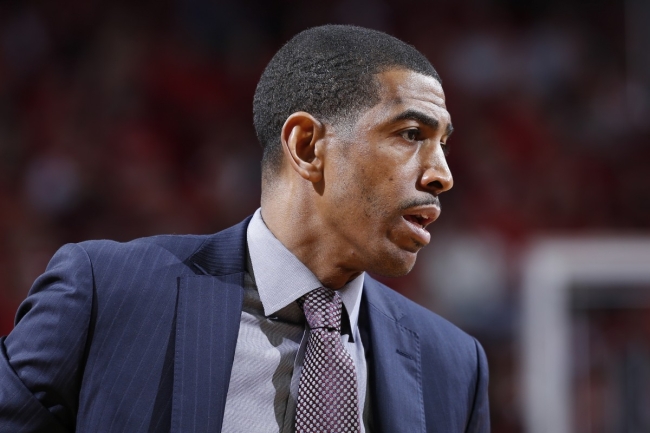You have /5 articles left.
Sign up for a free account or log in.

Kevin Ollie
Getty Images
A former University of Connecticut head men’s basketball coach who broke lesser National Collegiate Athletic Association rules will nevertheless be essentially unemployable by a team for the next three years for lying during an NCAA investigation. The punishment seems to reflect officials’ growing intolerance for unethical behavior among head coaches.
Kevin Ollie, who took over the UConn team in 2012 from high-profile head coach Jim Calhoun, was fired more than a year ago after the program’s possible violations of NCAA policies became public.
The NCAA’s Division I Committee on Infractions on Tuesday imposed a three-year show-cause order on Ollie, which will severely limit his ability to be hired as a coach by an NCAA institution. This stems from Ollie giving false information to NCAA investigators during an interview in March 2018. Ollie refused to participate in follow-up interviews, which also contributed to his punishment.
A trainer, whom Ollie described to the NCAA as a “good friend” and “like family,” worked with three athletes both on campus and in Atlanta in 2016. The trainer worked with the players on campus without being paid. Later, the players traveled and stayed with the trainer in his home in Atlanta, receiving free meals and free training sessions. Ollie denied knowing about the workouts, but the NCAA noted this was unlikely, given Ollie’s close relationship with the trainer and other testimony that he gave. Ollie later admitted that the workouts had occurred.
Ollie also comped tickets to multiple men’s basketball games for the trainer in 2016 and paid for his lodging at a campus hotel. At the time, the trainer’s son was a prospect for the UConn football team.
Ollie also apparently arranged video calls between two former UConn basketball stars, Ray Allen and Rudy Gay, and a recruit. The NCAA said Ollie lied to investigators about his role in facilitating at least one of the calls.
Given the seriousness of Ollie’s actions (the NCAA considered his false statements a Level I infraction, the most severe of rules violations), he could have been hit with a show-cause order for between three years and a decade. Joel Maturi, chief hearing officer for the infractions panel and former University of Minnesota athletics director, did not explain why the NCAA went with the lower end of the scale in a conference call with reporters Tuesday.
Maturi said on the call that in recent years the NCAA has put greater emphasis on the responsibilities of head coaches, and that being “candid” and “honest” are important factors to preserving the collegiate model.
“Failing to give the enforcement staff truthful information significantly harms its ability to conduct a thorough and timely investigation,” the NCAA’s report on the case states. “The conduct was contrary to the standards of ethical conduct that the membership expects of athletics staff entrusted to set an example for student-athletes.”
After the university fired Ollie, in part an attempt to avoid more NCAA sanctions, it also self-imposed certain penalties, including reducing the number of basketball scholarships in the coming academic year from 13 to 12, as well as a $5,000 fine and restrictions on recruitment.
The NCAA on Tuesday also placed the university on two years of probation and ordered that the games in which ineligible athletes competed be vacated. The latter is a fairly meaningless punishment, as it will not affect the Huskies’ championship win in 2014 and the team had poor showings in the 2016-17 and 2017-18 seasons, which are the two that are expected to be vacated.
UConn said it would accept the NCAA’s decision.
"As we anticipated, this validates UConn's actions and decision making in this case from the outset in early 2018 based on our knowledge of NCAA rules and matters of compliance," Susan Herbst, the university's president, said in a statement. "However, this is a serious matter and nothing about it merits celebration. This is an unfortunate chapter in the history of UConn men's basketball, but it is time to move on. We look forward to the bright future of this program with excitement and optimism."
The NCAA also found that over four years, former men’s basketball student managers attended preseason pickup games. The games counted as impermissible athletic activity mostly because the managers kept statistics that they distributed to coaches.
The team’s former video coordinator reviewed plays with and answered questions for athletes on and off the court, which the NCAA considered to be a coaching duty. Because of this, the program exceeded the number of allowable coaches. Both of these violations were deemed Level II, on a scale of one to four.
Ollie remains embroiled in a major legal battle with the university after it refused to pay him the remaining $10 million on his contract, saying he was not entitled to the money after the violations. The lawsuit states that the university was racially biased and treated him differently from his predecessor, Calhoun, who was suspended from three Big East conference games in 2011 after violating recruitment rules, but kept his job.
UConn recently announced it will rejoin the Big East after several years in the American Athletic Conference.




